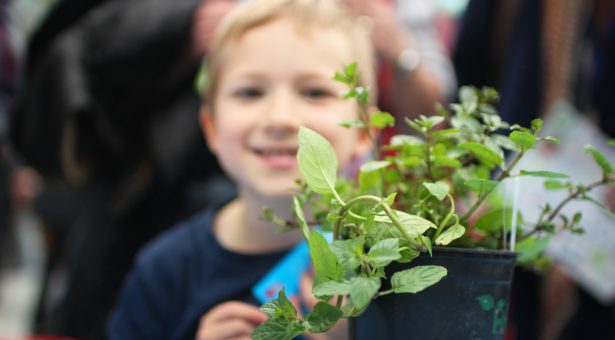Green Planet: Engaging the next generation of plant scientists

Like many of you, I avidly watched the latest series of David Attenborough on the BBC.
Green Planet introduced people to the strange and wonderful world of plants from across the world in a way that many of us will never have seen before. As a plant scientist, I was delighted to see plants in the limelight for a change and it made me think about how important visibility is when it comes to career choices.
I have always been interested in science and since a young age I have been fascinated by how things work. But like many children, I remember taking most interest in projects involving people and animals. This was largely down to an influential teacher at an early age, who had a profound impact on me. I vividly remember being absolutely spell-bound by a dissection he did in front of our class.
It wasn’t until much later that plant science really sparked my interest – and I can pinpoint it to a very specific moment. On a school field trip to Juniper Hall in Surrey at the age of 17, I was fascinated to learn about the diversity of plants. Seeing the different floras growing in acid and alkaline soils inspired me to think about why these different species were growing in different environments. From then until the end of my undergraduate years I was fascinated by plant ecology. What made plant species grow where they grow? And how this is related to the physiology of the plant?
Unfortunately, not many students do have that epiphany moment when they get interested in plant sciences. Although the life sciences are a very popular choice for university study, many students find themselves more interested in biomedical topics.
Without plants there would be no complex life on earth. Plants harvest the energy from the sun and convert that energy into all the living things that we see. They underpin the food chain and everything we eat depends on plants. Ultimately, they are responsible for all of life on earth.
Plant and microbial science are going to be critical in helping us answer some of the greatest challenges that humanity faces. How can we feed an ever-growing population? What happens if the next global pandemic is an infection of crops? How can we slow the pace of climate change with more sustainable methods of farming?
I’d argue these topics are just as important to people’s lives, maybe even more so, than the search for cures to diseases that drives many students into the biomedical sciences. So why the gap in interest and what can be done about it?
There are schemes in place to help address this. Here at the John Ines Centre we run a Science Camp for Year 10 students, focused on plant science and microbiology.
We support the Youth STEMM Award, set up by JIC alumna Dr Samantha Fox, which encourages young people to undertake STEMM-based activities to build skills and knowledge and explore future career pathways in the STEMM areas (Science, Technology, Engineering, Maths and Medicine).
Other initiatives to inspire interest in plant science at young age include the Science Art and Writing (SAW) Trust and the Teacher Scientist Network (TSN).
And for undergraduate students, the Gatsby Plant Science Summer School and our International Undergraduate Summer school feature talks from leading scientists, careers sessions, research experience and thought-provoking discussions with plant scientists.
These initiatives are great, and evidence shows that they’re all having an impact on young people, but it feels like there is still more to do to fly the flag for plants.
Seeing David Attenborough put across such strong messages about the vital role of plants on prime time national television heartens me. His programmes are watched by millions of people, and he has such an important role in our collective psyche. I’m hopeful that his messaging on how relevant plants are for all our lives will have hit home with a new generation of budding young scientists, eager to make an impact on the world in plant science.



